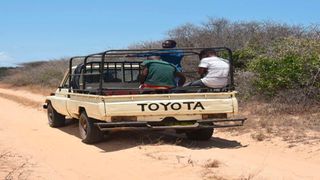Breaking News: At least 10 feared to have drowned in Makueni river

Passengers on board a vehicle travelling through Boni-Dondori forest in Lamu County in this picture taken on March 6,2020.
| Evans Habil | Nation Media GroupLamu
Premium
Why travelling to Lamu is not for the faint-hearted
What you need to know:
- The journey is always smooth from Mombasa to Kilifi, but things change when one gets to Gamba area in Tana River County, where there is the first security checkpoint.
Adnan Sherriff has been shuttling between Mombasa and Lamu for more than three decades.
Although he’s been doing this since he was born, Mr Sheriff admits the 300km journey always keeps him on the edge as it usually feels like travelling to another country.
The constant fear of attacks from militants and the numerous security checkpoints make it a dangerous expedition. The adrenaline rush whenever there’s a slight scare can leave one thoroughly shaken.
“The travel restrictions have made things worse for us. It has become more difficult to travel, because we cannot do it at night. I have to be at the bus terminus at either 7am, or 10am. If I miss the two buses, I have to wait for the next day,” says Mr Sheriff.
“Even if I choose to travel in a private car, I won’t be able to arrive in Lamu on the same day, because of security measures on the road.”
The journey is always smooth from Mombasa to Kilifi, but things change when one gets to Gamba area in Tana River County, where there is the first security checkpoint.
“Passengers alight with all their luggage for inspection. They also enter the bus for more checks. They look at our IDs. For children, they demand birth certificates,” says Mr Sheriff.
Anyone who fails to pass the security check remains at this point and is not allowed to proceed with the journey. He or she is detained for further investigations.

The Tawakal bus station in Mombasa County as pictured on June 17, 2014.
Police escorts
Gamba is the meeting point for all buses, private vehicles and trucks on their way to Lamu.
“From here, we get two police escorts. A land cruiser leads the way with four officers and another follows behind with four officers. We are then escorted to Hindi, about 90km from Gamba, before the vehicles are allowed to proceed to Lamu,” offers Mr Sheriff.
These escorts are only available twice a day, explaining why buses only travel in two batches at 7am and 10am.
Tawakal Bus Company operations manager, Abdalla Ahmed alias Boke, who has travelled the route for years, says the frequent security checks have discouraged most people from using the road.
“The escorts began in 2014 after the Mpeketoni attacks. We would previously be accompanied by two officers on the bus. There were two special seats reserved for them next to the door,” he says.
Three years later in 2017, the Coast regional commander Rashid Yakub increased the escorts from two to four times a day. This went on until last year when there was a national lockdown. When buses resumed, there was only one escort a day.
This meant that all the vehicles travelling to Lamu had to be at Gamba by 1pm. Vehicles arriving after the escort has left spend the night at the deserted place until the following day.
“Earlier this year, the escorts were increased to three a day following pressure to launch the port, meaning at least three buses would ply the route. All this is done to ensure the safety of travellers,” says Mr Ahmed.
Radio calls
Having worked on the route for more than two decades, he says at some point the bus company had to introduce radio calls due to insecurity.
They were used for communication between the drivers and the main office in Mombasa to alert them in case of an emergency.
“We always had to be informed the happenings the road. I remember a day when I received a radio call from one of our drivers telling us that they almost encountered an attack,” he says.
“Since he had received an alert from a driver who was ahead of him, he reversed for more than a kilometre to branch into another route to Garsen town. Unfortunately, the driver who was in the other vehicle was attacked.”

Buses plying the Mombasa-Lamu route are seen parked at Minjila trading center, awaiting armed escort ahead of a journey on Garsen-Lamu road, which is prone to attacks by al-Shabaab terrorists hiding in Boni Forest.
For Salim Swaleh, another passenger, it’s usually a huge relief when he arrives in Lamu.
“I usually pray, because it’s a long journey and anything can happen on the road; whether it is a puncture or an attack. My family lives in Lamu, so I am always on the road,” he says.
Bus companies have urged the government to reduce the security checkpoints on the road because it’s now safer.
“The last time we had an attack was almost two years ago. Currently, the road is smooth and there are security camps all over. Why can’t the government allow us to travel anytime and give us two policemen as it was before? That will also open up the region to domestic tourists and create jobs,” says Mr Ahmed.
Tawakal withdrew its buses from the Nairobi-Lamu express route, citing frustrations faced by their customers due to numerous stop-overs for security checkpoints that many times resulted in the passengers spending the night in the cold.
Early last year, heavily armed men in jungle fatigue attacked a bus on the route and sprayed it with bullets. Luckily, the passengers escaped unhurt.





